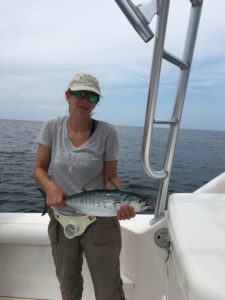I did something really stupid this summer. I brought a banana on the fishing boat. You’re probably doing one of two things right now; 1. Rolling your eyes at my stupidity or 2. Asking what’s the deal with bananas on the boat?
It turns out, bringing a banana on the boat is one of the oldest superstitions in fishing. It’s reported to cause motor failure and no fish. There are charter captains who make guests throw their bananas overboard if caught with them. How could I, a lifelong boater and long-time angler, not know about this superstition?
This has me thinking about investing superstitions. A search for investing superstitions revealed this 2009 gem of a post from Josh Brown. I am unfamiliar with most of these superstitions, and that’s probably because they all apply to trading rather than long-term investing.
My husband will change shirts in the middle of a Saints game if they are losing. It has something to do with the color of his jersey and whether it brings the right kind of “energy”. The first time I witnessed him changing clothes (sometimes multiple times) during a game, I was aghast. I now select my clothing carefully on game day, lest I be blamed for another Saints loss.
Merriam-Webster defines Superstition:
1a: a belief or practice resulting from ignorance, fear of the unknown, trust in magic or chance, or a false conception of causation
1b: an irrational abject attitude of mind towards the supernatural, nature, or God resulting from superstition
2: a notion maintained despite evidence to the contrary
There’s something magical about superstitions, no pun intended. I am now a believer of the banana on the boat theory, but more on that later.
Given what we know about behavioral economics, might we be able to harness the power of superstition to entice investors towards behaviors that lead to better outcomes?
Here are a few superstitions I suggest we adopt:
- Never trade when you are fearful (or greedy) – The oldest adage in the investor playbook is to avoid making decisions based on emotion. Yet time and again, investors run for the hills when markets decline and can’t seem to get enough at the end of a bull market. A little gut check on your emotions before trading could go a long way to reducing the behavior gap.
- Never reach for yield – Income seeking investors are also the most risk averse. With low interest rates, investors living on a fixed income are tempted to reach for higher yields. If an asset class or individual bond is yielding more than the current interest rate environment suggests, the market is signaling higher risk. It’s a good idea to ask more questions when you see a high yield.
- Today is the best day to invest, if you didn’t invest yesterday – The magic of compounding returns makes investing sooner rather than later imperative. Market timing is a losing game. As long as your money is earmarked for the long-term, invest today rather than trying to catch a downturn. Some investors have been waiting since 2009.
- Saving is more important than investing when you are young – Market returns cannot make up for a low savings rate. If Americans spent as much time worried about how much to save for the future as they do on daily market movements, there likely would not be an impending retirement crisis.
I don’t know how to make these common sense suggestions become superstitions, but they would be very useful as such.
Back to the fishing trip.
We were 30 miles offshore and about a mile from the first fishing spot. One of the engines completely shuts off, no warning signal, just dead. After a few minutes in the engine room, the captain couldn’t diagnose the problem. We putting over the first fishing hole and caught nothing. With one engine, it would take hours to get back to shore, so moving on to the next spot wasn’t an option. We slowly made our way in, attempted to troll, and caught nothing edible.
I am clearly not impressed with this small bonita.

What happened to that banana? I chunked it into the Gulf of Mexico some time after the engine failed but before we admitted the day was a defeat.
I will never take a banana on a boat again, not a chance. I’m a believer!
Post Script: I offer my sincere apologies to Captain Bill, First Mate Jan (aka Mom and Dad), Caryn, Hollister, Chuck, and Cameron for my mistake.



